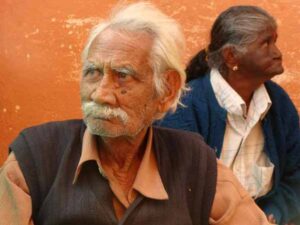Introduction- The Maintenance and Welfare of Parents and Senior Citizens (Amendment) Bill, 2019,
The Maintenance and Welfare of Parents and Senior Citizens (Amendment) Bill, 2019, which
aims to protect senior citizens and parents including those who are neglected and are unable to
support themselves.
With more than 135 million elderly people, India today has the second-largest population of
senior citizens who deserve care and concern. The fast-paced and ever-changing life of today is
continuously widening the gap between generations. Thus the creation of a happy environment
for the elderly is our traditional, moral, and now even legal responsibility.
The Bill expands the scope of The Maintenance and Welfare of Parents and Senior Citizens
Bill, 2007, passed by Parliament during the term of UPA-I and adds certain provisions for their
wellbeing and safety. It provide for the maintenance and welfare of parents and senior citizens
for ensuring their basic needs, safety and security, establishment, management, and regulation
of institutions and services, and rights guaranteed under the Constitution.
The Maintenance and Welfare of Parents and Senior Citizens (Amendment) Bill, 2019 –
Salient Features
Expansion of Definitions
As per the 2007 Act “children” included children and grandchildren, excluding minors. This
bill adds stepchildren, adoptive children, children-in laws, and the legal guardian of minors to
the definition.
The Bill defines a “relative” as the heir of a childless senior citizen, excluding minors, who
possess or would inherit his property after death. The Bill amends this to include minors
represented by their legal guardians.
“Parents” to include biological, adoptive, and step-parents. The Bill expands this definition to
include both parents-in-law and grandparents.
The fact that under this bill Senior citizens can claim maintenance from all admissible relatives
or legal heirs, is a significant measure. Further, the above change in the definition of 'children'
has also been simultaneously reflected in the definition of 'parent' in the Amendment Bill.
It must also be noted that with the revised definition of 'relative' in the Bill, wherein minors
have been included in the category of 'relative', senior citizens would now be able to claim
maintenance from minors, too, through their legal guardians.
Maintenance and Welfare
As per The Maintenance and Welfare of Parents and Senior Citizens (Amendment) Bill, 2019,
“Maintenance” includes the provision of food, residence, and medical attendance, this bill adds
healthcare, safety, and security for parents and senior citizens to lead a life of dignity to it.
Welfare includes the provision of food, healthcare, and other amenities necessary for senior
citizens, this bill adds housing, clothing, safety, medical attendance, healthcare, treatment,
recreation and other amenities necessary for the well-being of a senior citizen or parent to the
list.
This expansion in the definition of welfare has given welfare oriented impetus to it in actual
sense.
 Removal of Rs.10,000/- Ceiling as Maintenance Amount
Removal of Rs.10,000/- Ceiling as Maintenance Amount
The Maintenance and Welfare of Parents and Senior Citizens Act 2007, allows state
governments to constitute maintenance Tribunals to decide on the maintenance payable to
senior citizens and parents. These Tribunals may direct children and relatives to pay a monthly
maintenance fee of up to Rs 10,000 to parents and senior citizens.
The Maintenance and Welfare of Parents and Senior Citizens (Amendment) Bill, 2019 removes
the upper limit on the maintenance fee. The Tribunals may take the following into
consideration while deciding the maintenance amount:
The standard of living and earnings of the parent or senior citizen, and
The earnings of the children.
The bill also envisages a provision that applications from Senior citizens above 80 years of age
should be disposed of within 60 days.
Maintenance Officer
The Maintenance and Welfare of Parents and Senior Citizens (Amendment) Bill, 2019 provides
for a maintenance officer to represent a parent during proceedings of the Tribunal. The Bill
requires maintenance officers to ensure compliance with orders on maintenance payments, and
act as a liaison for parents or senior citizens.
Registration of Senior Citizens Care Homes/Homecare Service Agencies etc
Under the Act of 2007, State Governments may set up old age homes. The Maintenance and
Welfare of Parents and Senior Citizens (Amendment) Bill, 2019 removes this and provides for
senior citizen care homes which may be set up by the government or private organizations.
These homes must be registered under the State Government. The Central Government will
prescribe minimum standards for these homes, such as food, infrastructure, and medical
facilities.
Healthcare, Protection and Welfare Measures
The Act of 2007, provided for certain facilities (such as separate queues, beds, and facilities for
geriatric patients) for senior citizens in government hospitals.
The Maintenance and Welfare of Parents and Senior Citizens (Amendment) Bill, 2019 requires
all hospitals, including private organisations, to provide these facilities for senior citizens.
Further, home care facilities will be provided for senior citizens with disabilities.
The Bill requires every police station to have at least one officer, not below the rank of
Assistant Sub-Inspector, to deal with issues related to parents and senior citizens. State
governments must constitute a special police unit for senior citizens in every district which will
be headed by a police officer, not below the rank of Deputy Superintendent of Police.
Offences and penalties
The Maintenance and Welfare of Parents and Senior Citizens (Amendment) Bill, 2019
increases the penalty for the abandonment of a senior citizen or parent from the imprisonment
of up to three months to imprisonment between three and six months, and fine of up to Rs
5,000, to Rs 10,000. The Bill also provides that failure to comply with the maintenance order
by children or relatives may lead to imprisonment up to one month, or until the payment is
made.
Conclusion
The Maintenance and Welfare of Parents and Senior Citizens (Amendment) Bill, 2019 has two
aspects; One, that it Widens the scope Senior citizens to claim maintenance and secondly, it
imposes a legal obligation upon the children and the government to look after the well being of
senior citizens.
Expansion of children, parent, relative definition will leave no scope for ambiguity, and letter








